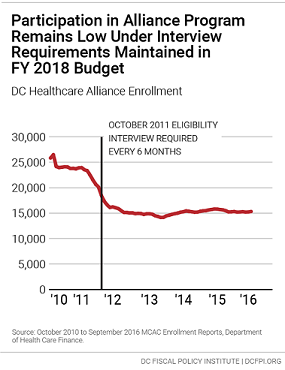Chairperson Gray and other members of the committee, thank you for the opportunity to submit testimony. My name is Jodi Kwarciany, and I am a Policy Analyst at the DC Fiscal Policy Institute. DCFPI engages in research and public education on the fiscal and economic health of the District of Columbia, with a particular emphasis on policies that affect low- and moderate-income residents. I am also part of a coalition of stakeholders interested in improving access in the DC Healthcare Alliance program.
The purpose of my testimony is to voice my support for B22-231, the “Department of Health Care Finance D.C. HealthCare Alliance Amendment Act of 2017.”
DCFPI has long supported efforts to simplify the recertification process within the Alliance program. We share concerns with many local organizations about eligibility requirements instituted in 2011 that have affected Alliance enrollment and access to care. Since then, DC residents participating in the Alliance have been required to visit an Economic Security Administration service center every six months to re-certify their eligibility. The new requi rement was followed by a rapid decline in enrollment, from roughly 25,000 beneficiaries to 15,000 beneficiaries in one year. Alliance participation has not changed much since then and now stands today at 15,300.
rement was followed by a rapid decline in enrollment, from roughly 25,000 beneficiaries to 15,000 beneficiaries in one year. Alliance participation has not changed much since then and now stands today at 15,300.
Improving access to the Alliance is important because the uninsured rate for DC’s undocumented immigrants, who are eligible to receive coverage through the Alliance, stands at 13.4 percent, or about three and a half times our District-wide average of 3.8 percent. This means we are still not reaching many eligible individuals.
The Alliance Recertification Simplification Act would address this by allowing Alliance participants to complete their recertification annually instead of every six months, and do so through DC Health Link, the District’s health insurance exchange, when capabilities allow. Overall, this will lift an enormous burden for Alliance beneficiaries.
This legislation would improve the current process and improve program outcomes in four key ways:
- It would make it easier for eligible beneficiaries – especially those who work and/or have young children – to maintain their benefit. About 33 percent of Alliance participants do not re-apply at the six-month period, and at the 12-month period, nearly half do not. This seems clearly connected to the barrier of the recertification process. Completing recertification often requires arriving at an ESA center hours before opening to stand in line, waiting for long periods for language assistance, or going several times to complete one re-certification. When individuals worry less about getting health coverage, they can focus their attention instead on their families, education, and employment – all things that positively contribute to our community.
- It may help alleviate rising per-member costs and improve health outcomes. It appears that many residents only sign up for the Alliance when they are in high medical need, meaning that they avoid regular and preventive care. Per-member monthly costs for Alliance members grew by 22 percent in 2016, compared to a 6 percent increase for adults in our Medicaid program during the same period. By making it hard for residents to get health coverage, we have to be conscientious of the costs we’re potentially shifting to down the road when people become sicker, including more frequent use of our emergency rooms.
- It will reduce the strain on, and increase the efficiency of, the Department of Human Services. Data collected in 2015 suggest that Alliance recipients make up one-fourth of service center traffic in a given month, even though they represent less than 10 percent of individuals in DC’s health insurance programs. While DHS is working to implement a business process redesign initiative, reducing volume at service centers will further help alleviate congestion. What’s more, altering the recertification period back to 12 months will put Alliance in line with Medicaid, helping to standardize processes and increase DHS efficiency.
- It will send a more positive message to individuals of immigrant status about their place in the community. The District has long been known as a welcoming city for immigrants, including its designation as a Sanctuary City. However, it is difficult to encourage immigrants to take advantage of programs for which they are eligible, like the Alliance, when the District imposes additional barriers to participation. Some applicants have described the enrollment process as confusing, intimidating, discriminatory, and inflexible.
For all of these reasons, we believe that the D.C. HealthCare Alliance Amendment Act is a critical step for Alliance beneficiaries that will help address community needs and advance our commitment of reducing our uninsured. We welcome opportunities to work with you further on this important topic.
